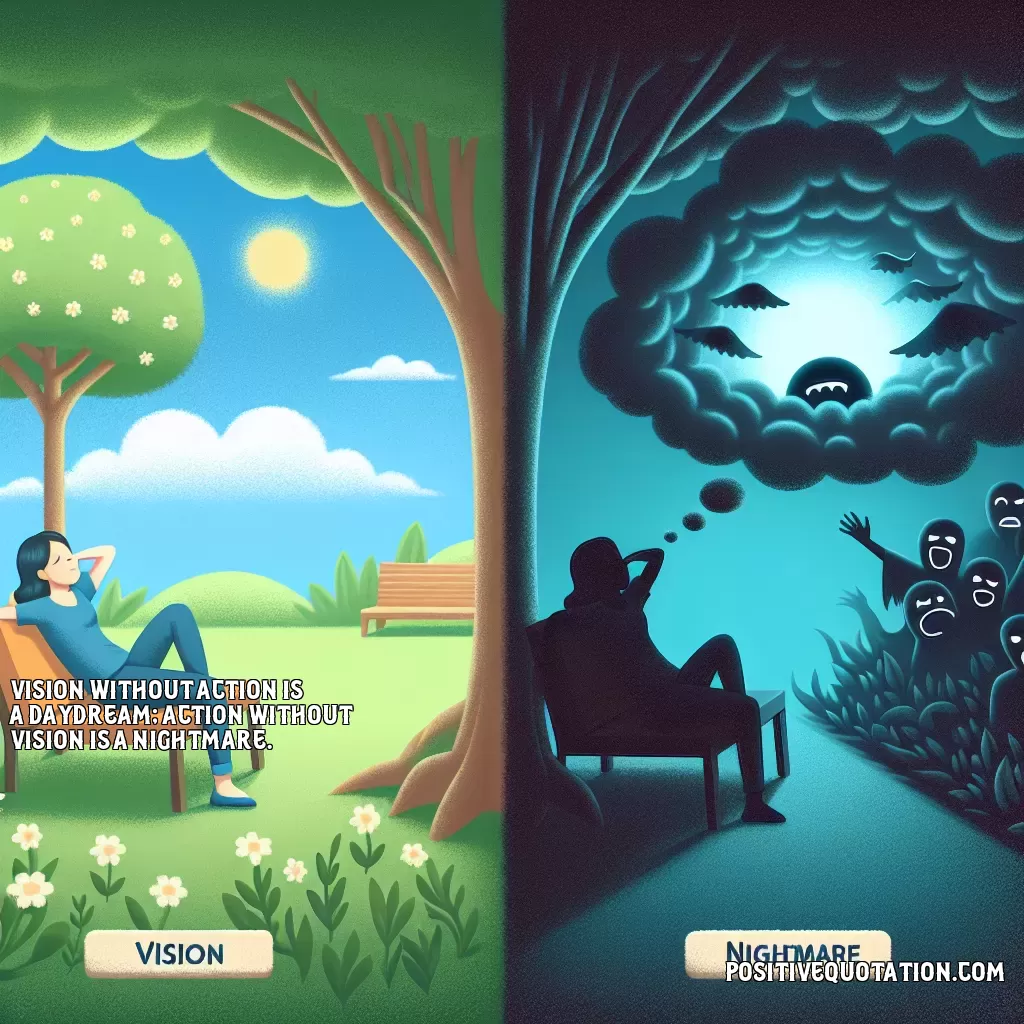
Vision without action is a daydream; action without vision is a nightmare.
The quote "Vision without action is a daydream; action without vision is a nightmare" speaks to the vital relationship between thoughtful planning and practical implementation in achieving meaningful results. At its core, the quote emphasizes that merely having a vision or an idea, however grand it may be, is not sufficient for real progress. When a vision exists without corresponding action, it remains just a dream, disconnected from reality. This notion of daydreaming suggests a lack of concrete steps toward making aspirations a tangible reality. It highlights the futility of having high hopes or ambitions that are never acted upon, leading to stagnation and a disconnection from achievable goals. Conversely, the statement warns that taking action without a clear vision can lead to disorder and misdirection—a nightmare scenario. Without a guiding vision, actions may become erratic, unfocused, and ineffective. This disarray can result in wasted effort, frustration, and even failure as one reacts to circumstances rather than progressing towards a meaningful objective. In essence, the quote underscores the necessity of harmonizing vision and action. Effective progress requires a clear understanding of one's goals, which informs and directs the actions taken to achieve those goals. For individuals and organizations alike, cultivating a strategic vision while simultaneously laying out actionable steps can create a balanced approach to success, instilling purpose and direction in both planning and execution. The interplay of vision and action becomes the foundation upon which meaningful accomplishments are built, fostering a pragmatic path toward desired outcomes.
Quote By: Japanese Proverb
**The Wisdom of Japanese Proverbs: A Reflection of Culture and Philosophy**
Japanese proverbs, or "kotowaza" (ことわざ), serve as a rich tapestry of wisdom passed down through generations. These succinct sayings encapsulate the essence of Japanese culture, philosophy, and the daily experiences of its people. Rooted deeply in Japan’s history, these proverbs reflect values such as perseverance, humility, and respect for nature, showcasing the collective consciousness and moral teachings of Japanese society.
The origins of many Japanese proverbs can be traced back to ancient literature, folklore, and the teachings of Buddhism and Confucianism. These proverbs often employ metaphors drawn from nature, illustrating principles that resonate universally. For example, the proverb "Ii koto wa, kaze ni naranai" (良いことは風にならない) translates to "Good deeds do not become the wind," highlighting the enduring impact of kindness and virtue.
Japanese proverbs have been instrumental in guiding generations regarding personal conduct and societal expectations. They serve as tools for imparting wisdom in a compact and memorable format, making them a staple in both spoken and written language. In the works of notable writers like Kenji Miyazawa, Japanese proverbs find a place alongside original narratives, reinforcing cultural values and philosophical ideas.
Authors such as Haruki Murakami have drawn inspiration from these traditional sayings, weaving them into modern narratives that resonate with contemporary readers. Murakami's works often reflect the nuances of Japanese life, and proverbs provide a bridge connecting that life to a broader philosophical context. The interplay between traditional wisdom and modern storytelling is an essential feature of Japanese literature, showcasing the enduring relevance of proverbs in today’s world.
In essence, the significance of Japanese proverbs extends beyond mere sayings; they are a lens through which one can view the complexities of Japanese life, ethics, and aspirations. By understanding and embracing the teachings encapsulated within these proverbs, one can appreciate the profound wisdom that continues to shape not only Japanese culture but also the universal quest for meaning and understanding in our lives. In a fast-paced world, the philosophy of Japanese proverbs remains an invaluable resource, offering timeless lessons that transcend cultural boundaries.